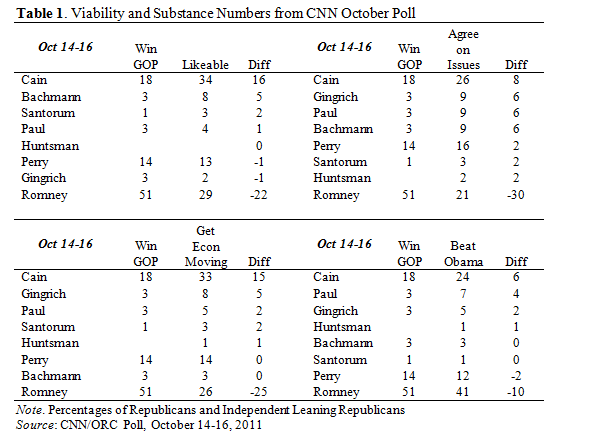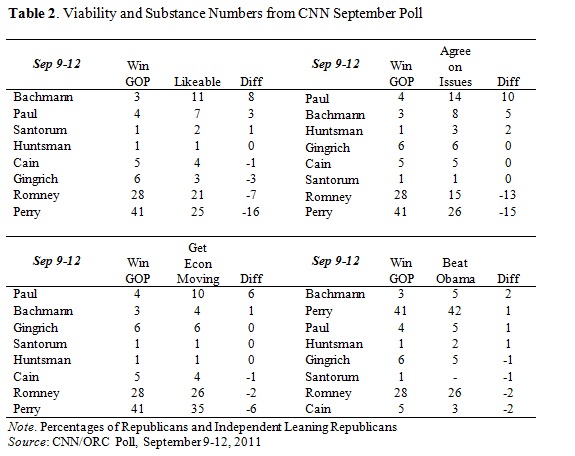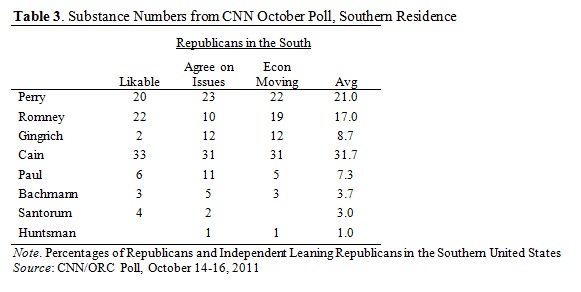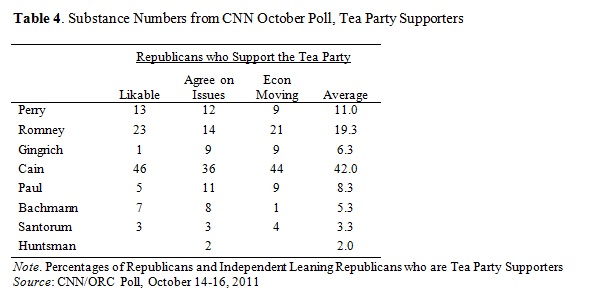
While former Massachusetts governor Mitt Romney has been a staple in GOP presidential campaigns for at least the past five years he has yet to sway a majority of Republican that he's "the one" for them. On at least three indicators of candidate preference among self-reported Republicans Romney's numbers are competitive, but inconsistent with beliefs that he will be the eventual nominee.
According to recent CNN polls, Romney is viewed as the candidate most likely to win the GOP nomination, yet he is not the most liked, and his stances on issues are not strongly aligned with large numbers of Republicans. It appears that Republicans are yearning for another candidate who can excite them, and are only supporting Romney because they think he has the "best chance" of beating Obama--which doesn't mean they think he will.
We can gauge the divide between Romney's perceived viability and "love" from Republicans by calculating the percentage point differences between those who think he will likely win the nomination versus other indicators of candidate preference. When these numbers are calculated (in tables below) across the board Romney is at or near the bottom of the GOP heap. These data suggest that Republicans might be willing to "hold their noses" and support Romney even though he does not measure up in terms of likeability, ability fix the economy, or issue agreement. This could have implications for turn-out and unity among Republicans.
CNN polls over the past two months -- one conducted September 9-11, and another conducted October 14-16 -- have tracked Republican and Independent leaning Republican (henceforth "Republicans") public opinions on 1) who is most likely to win the GOP nomination for president, 2) likeability, 3) agreement on issues, 4) who is most likely to get the economy moving, and 5) who has the best chance of beating the incumbent, Barack Obama.
The question of "who is most likely to win" -- asked first in the list of questions -- provides an indicator of perceived viability for the Republican nomination, ability to beat Obama is another indicator of viability for the general election, and the other three questions are more in-line with substantive judgments about each candidate. Since each of the questions was asked in a "list" fashion (i.e., one question with about 11 names to remember) one can argue that this is a type of ballot.
Table 1 contains data from the October poll. Results show that a slight majority of Republicans say Romney is most likely to win the GOP nomination (Win GOP); however far fewer (-22 points) consider him most likeable (Likeable), agree with him the most on issues (-30 points), or say he is most likely to get the economy moving (-25 points). The smallest gap for Romney lies in perceptions that he has the best chance to beat Obama (-10).
In contrast to Romney, consider that Herman Cain's difference scores are all in the positive direction indicating that more Republicans like him, believe he can get the economy moving, agree with him on issues, and believe he can beat Obama, than believe that he will be the eventual GOP nominee. If Cain can persuade Republicans [and the national media] that he is viable his candidacy will put more pressure on Romney.
Also, note that Texas Governor, Rick Perry's numbers are relatively consistent, suggesting his core supporters seemingly match substance with viability.

It's not surprising that Romney's numbers on substance don't match his numbers on viability, the relatively high expectations about his being the nominee have increased in the wake of weakening support for Rick Perry. However, the viability-substance gap appears to be widening, which is not a good sign for the coming months.
The numbers from the September CNN poll in Table 2 show that prior to Perry's declining numbers, Romney's difference scores were much smaller, even if they were still inconsistent. While his perceived viability for the GOP nomination increased by 23 points, and his general election viability increased by 15 points, his likeability (+8 points), agreement on issues (+6 points), and ability to get the economy moving (0 points) hardly moved from September to October. This two month trend suggests that growing numbers about Romney being the presumed nominee are trending faster than the public's beliefs that he is the actually the public's preferred candidate.

When one considers two staples of Republican support, the South (Table 3) and the Tea Party supporters (Table 4), Romney's numbers suggest he still has work to do. If one takes the average of the substance indicators -- likability, agreement on issues, and ability to get the economy moving -- Romney lags Cain among Southern residents and Tea Party supporters. In fact, Perry's numbers are stronger than Romney's in the South suggesting that the "frame" of Romney as "elitist," and out of touch, may stick to him in the South (also, if Romney wins the GOP nomination, it's clear he will need a Southern conservative (cough!! "Gingrich") to lock-down states in the region).


A saving grace for Romney and his numbers is that we are still too far away from the primaries to truly gauge the relevance of these data. Just as Rick Perry's fortunes have turned in less than a month, so could Cain's numbers. For example, Cain has shown a low understanding of regional politics, foreign policy, and an inability to articulate and understand the facts of issues related to governing the country . He has already alienated many Muslims, Hispanics, and African Americans, and is on the verge of enraging unemployed segments of the population (99ers). As for Rick Perry, his debate performances speak for themself, and it's almost to the point where anything he says is a potential flub, gaffe, or joke (the YouTube videos are coming).
This analysis also has some methodological limitations. There are large margins of error associated with the results (between 6 to 9 percentage points); so relatively large differences may be much smaller in reality. In addition, while the questions are asked in a ballot type of fashion, they don't take into consideration that respondents may actually consider two or more candidates as equal; thus, Romney could be just as likeable as Cain, but it's not reflected in the data because of how the questions were presented to respondents.
In the end, what matters is that Romney's experience in presidential campaigns is not translating into runaway numbers. His two strongest challengers are an individual with no governing experience (Cain), and a late entrant into the GOP race (Perry). He will continue to be attacked from the crowded field of candidates, and issues related to Mormonism, "Romneycare," taxes in Massachusetts, his millionaire status and strong support for Wall Street and 'the market,' as well as rumors that he knowingly kept illegal immigrants working on (or for) his property, will not go away. If Republicans conclude he's another John McCain type (rich, unexciting, probably experienced, but not ready to lead), he will not fare well moving forward. However, if he can make a stronger case that he is worth "liking" and can unify the GOP, his nomination will be secured. But, that's a big IF, and an even bigger bet.